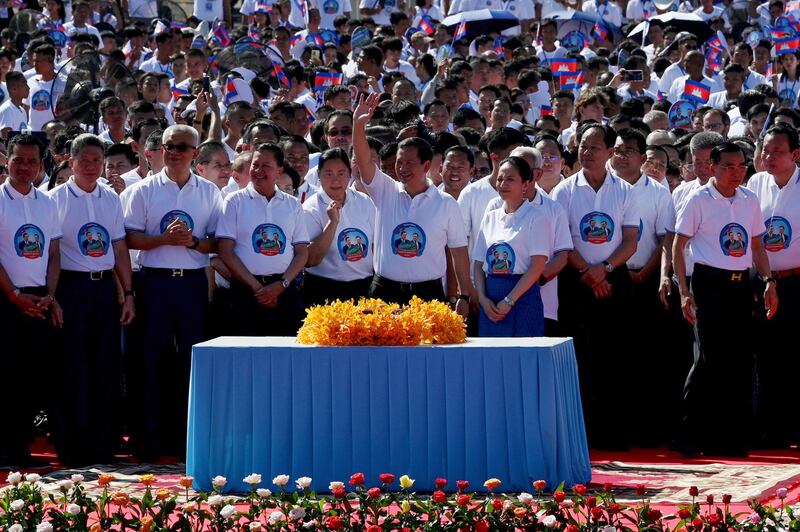Cambodia’s Prime Minister Hun Manet on Monday presided over the launching ceremony for the Funan Techo canal, a US$1.7 billion project that has been hailed in Cambodia as “historic” but has raised concerns in neighboring Vietnam.
Thousands of people gathered at the construction site in Prek Takeo, Kandal province, from early in the morning to attend the launch, reported the pro-government Khmer Times.
“Through the construction of the historic canal, we are showing a sense of patriotism and national unity,” Hun Manet was quoted as saying.
The Funan Techo canal project was proposed and approved when Hun Manet’s father, Hun Sen, was head of the government and analysts say it is being seen as one of the great legacies of the veteran leader, whose birthday is Aug 5.

Hun Manet said the 180-kilometer (112-mile) canal linking Cambodia’s capital, Phnom Penh, and the Gulf of Thailand will greatly benefit the economy as well as improve standards of living, when it becomes operational in 2028.
The canal was not just a waterway but “a living monument symbolizing the historical significance and greatness of the former Funan Empire,” the prime minister said, referring to the ancient rulers of what is now Cambodia and parts of Thailand and Vietnam.
All radio and TV stations across the country were reportedly requested to broadcast the ceremony that began at 6:30 a.m.
‘Cambodia will not negotiate’
Cambodia says that by directly linking the Mekong River system to its coast it will cut transport costs and help reduce by up to 70% dependence on Vietnam’s ports for international trade.
Hun Manet said at the launch that the first 21-kilometer (12.5-mile) section of the canal from Prek Takeo to the Bassac River will be 100% domestically funded.
The second section, of more than 130 kilometers (80 miles) from Koh Thom to Kep province, will be funded by both the China Road and Bridge Corporation, or CRBC, and a Cambodian firm as a build-operate-transfer project.
“Cambodian companies and state-owned enterprises are the majority holders here,” the prime minister was quoted as saying, “Sovereignty cannot be lost here.”
But the project has raised concerns in Vietnam where the rice-growing Mekong delta is vulnerable to sea water incursions if the flow of fresh water down the Mekong and into the delta is reduced.
Vietnam has repeatedly asked for more information on the canal’s environmental impact but Hun Sen, in an unusually forthright reaction to the concerns of his old ally, dismissed the worries saying Cambodia “will not negotiate.”
To date, no Vietnamese senior officials have spoken publicly about the canal’s possible impact.
After last month’s visit to Phnom Penh by Vietnamese President To Lam, no joint statement was issued and Vietnam’s state media didn’t mention the megaproject in its coverage of the trip.
RFA emailed the Vietnamese Ministry of Foreign Affairs to seek comment on Monday’s groundbreaking ceremony but didn’t immediately receive a response.
‘Shaky financial grounds’
“With the decision to go ahead with the canal, Cambodia is making every effort to bolster its agency amid great-power rivalry,” said Huynh Tam Sang, a lecturer at Vietnam’s National University.
“Hun Manet’s unwavering resolve also reveals the overarching power of his father, Hun Sen, who continues to wield considerable influence in Cambodia’s foreign-policy making process.”
RELATED STORIES
[ Cambodia will not negotiate over Funan Techo canal: Hun SenOpens in new window ]
[ Vietnam should ask Cambodia to delay canal project: expertsOpens in new window ]
[ Cambodia’s canal project would link its coast with the Mekong RiverOpens in new window ]
The Vietnamese analyst said that how the Hun Manet administration addresses issues such as the potential social and ecological impacts of the Funan Canal project on the Mekong delta “will be a litmus test for the Hun family’s ability to sustain power.”
Another analyst – Brian Eyler from the Washington-based Stimson Center – earlier told RFA that the project “appears to be on shaky financial grounds.”
Eyler said that it remained to be seen whether the project would progress fast beyond the groundbreaking ceremony.
If the project does stay on track, Huynh Tam Sang, said China’s role as the primary sponsor would likely bring Cambodia even closer into its orbit.
“While Cambodia and Vietnam are at odds over the canal, the Sino-Cambodian alignment may pose challenges for Vietnam, particularly when Hanoi has been seeking support for its stance regarding the South China Sea issue,” the Vietnamese scholar said.
Edited by Mike Firn.
